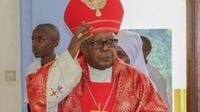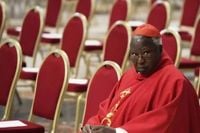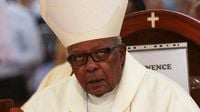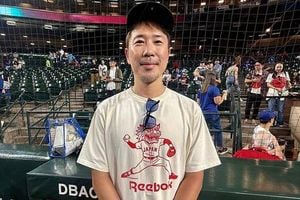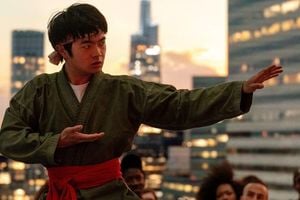The absence of Kenyan Cardinal John Njue from the conclave that begins today to elect Pope Francis's successor has sparked controversy. The emeritus archbishop of Nairobi stated that he was not invited to participate. Meanwhile, the Holy See and the Archdiocese of Nairobi claim that his absence is due to health issues. This exchange of statements has caused confusion just hours before 133 cardinals enter the Sistine Chapel.
Njue, 79 years old, is the only living cardinal from Kenya with voting rights. In an interview with the Daily Nation newspaper, he asserted: "I have not received any official invitation. It is not for health reasons." His words were surprising, as the Vatican had previously announced that Njue would not travel to Rome due to his physical condition. The Archdiocese of Nairobi, led by Archbishop Philip Anyolo, issued a statement contradicting the cardinal. According to Anyolo, Njue is in poor health and is not in a condition to participate.
The case is complicated by a recent episode. In 2024, the Annuario Pontificio changed Njue's birth date from 1944 to 1946. This "rejuvenated" him and allowed him to keep his eligibility to vote, as the age limit is 80 years. However, some media speculate that this correction, made in a context of imprecise records in colonial Kenya, may have influenced the controversy. The diocese has denied rumors about Njue's death up to three times, the last one a week ago, stating that "he is alive and well."
The absence of Njue, along with Spanish Cardinal Antonio Cañizares, also due to health, reduces the number of electors to 133. This means that 89 votes will be needed to elect the new Pope. The conclave, which starts this afternoon, will be the most diverse in history, with representatives from 70 countries. The first smoke signal is expected today, and the world awaits the white smoke that will announce the new pontiff.
Meanwhile, Njue's statements have caused debate. Some see it as an attempt to point out irregularities, while others believe it reflects internal tensions in the Church. For now, the Vatican has not offered more details, and the mystery surrounding the exclusion of the Kenyan cardinal remains unsolved.
The controversy escalated when Njue publicly declared, "I don’t know why I was excluded from the conclave," during an interview with the Daily Nation. He emphasized that his absence was not due to health issues, countering claims made by church authorities. The archbishop of Nairobi, Philip Anyolo, asserted that Njue was officially invited by the Apostolic Nunciature in Kenya, but due to health concerns, he could not travel.
Matteo Bruni, the Vatican spokesperson, clarified that cardinals do not require an invitation to attend the conclave. He noted that a verification process occurs through the dean of the College of Cardinals, and in Njue's case, the result was negative, indicating health issues prevented his travel.
The situation has drawn attention not only for its immediate implications but also for broader discussions about transparency and the politics within the Church. Njue’s age correction has raised eyebrows, as it seems to have been a strategic move to ensure his eligibility to vote. This incident is reminiscent of previous controversies surrounding other cardinals whose ages were revised under similar circumstances.
In a statement reflecting on the matter, Njue expressed frustration over the lack of clarity surrounding his status: "Those who go there for the election are usually sent official invites, and that has not happened on my part. The fact is that I have not been invited. I don't know why I've been excluded, if I'm not there it's not because I am in poor health."
The Vatican, however, stands firm in its assertion that Njue's absence is due to health concerns. The dichotomy between Njue's claims and the Vatican's statements has led to speculation about potential internal conflicts within the Church hierarchy.
As the conclave commences, the eyes of the world are on the 133 cardinals gathered in the Sistine Chapel. The first votes are expected to be cast this evening, May 7, 2025. The process will be shrouded in secrecy, with the cardinals cut off from the outside world, and the telephone signal jammed to prevent any communication.
The first smoke signal will indicate whether a new pope has been elected or if further voting is required. White smoke will signify a new pontiff, while black smoke indicates that the electors have not yet reached a consensus. Speculation is rife regarding potential candidates, with Pietro Parolin, the Vatican Secretary of State, emerging as a frontrunner with significant backing.
As the conclave unfolds, the implications of Njue's absence may echo far beyond this event, potentially influencing discussions about the Church's governance and the transparency of its processes. The situation serves as a reminder of the intricate interplay between faith, politics, and the personal dynamics that shape the future of the Catholic Church.
